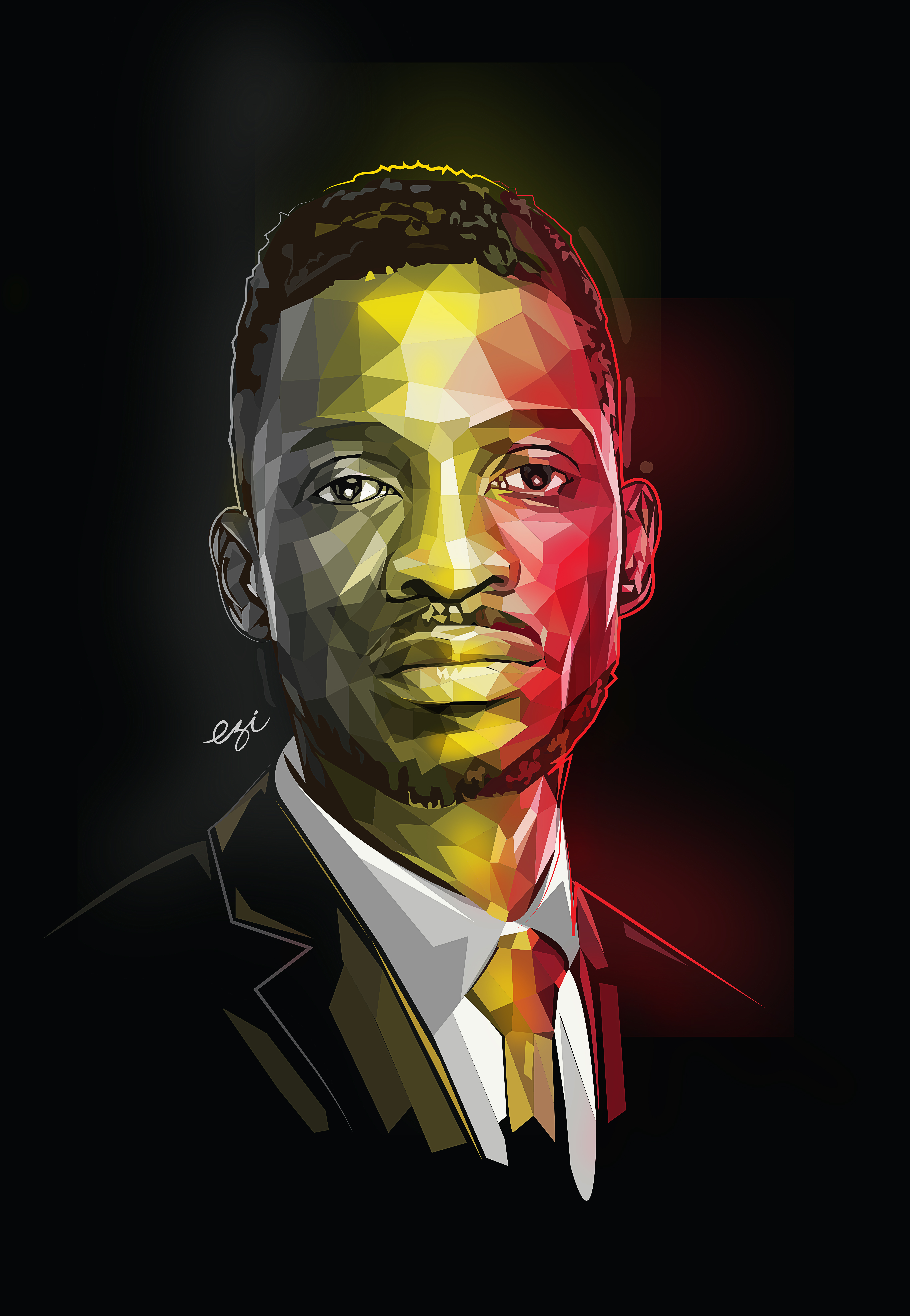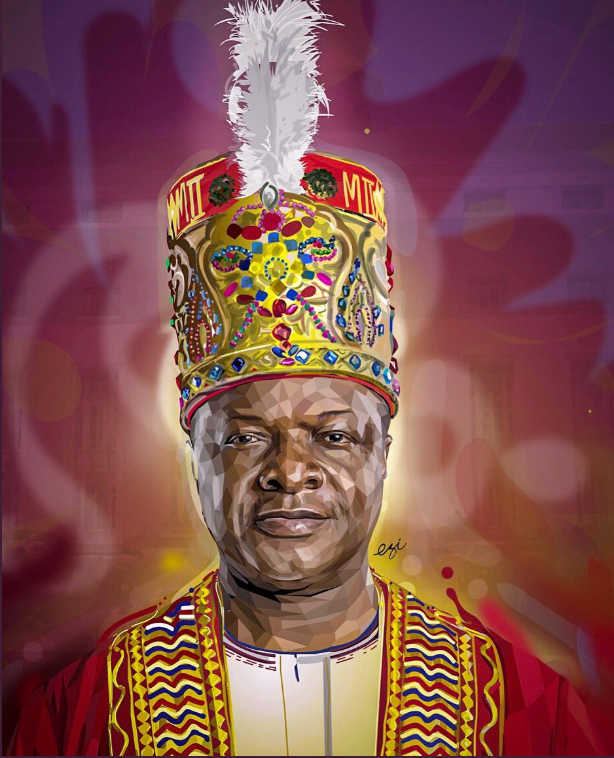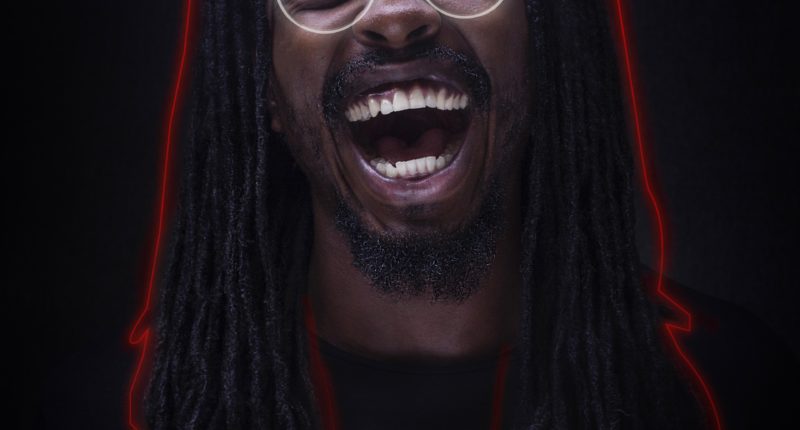It is a cloudy Saturday midmorning when I meet Hillary Mugizi. He shows up in camouflage shorts and green sneakers with clean white soles and a black jumper zipped to the neck with the sleeves pulled back to the elbows. The hoodie of his jumper rests below the interlocking web that is the twine of his neatly pressed black dreadlocks.
A tattoo on his right hand is very visible. It is the image of a mother and her child, a reminder, he tells me, of his dear mother whom he did not have the chance to see.
A Christ-like-crown of thorns encircles his elbow. “It was the most painful tattoo of them all,” he says while retracing it like he can still feel the pain. A dove with its wings spread out marking an era of a new beginning is another that flying towards his wrist.
On seeing me, he stretches out his hand to greet me.
Hillary Mugizi is a Ugandan artist who specialises in vector art, the use of polygonal shapes to form an art piece, he would later tell me.
One thing that has stayed clear in Hillary’s mind from the time he was a young boy at school has been his interest in art. He has never wished to be or to do anything else other than this. His has been a journey of both passion and profession, he says.
“While at university, I once differed with the lecturer. He wanted all of us to do things like him but I thought different. I decided to pursue the line of difference.”
The lecturer did not welcome the challenge and their relationship would be an uneasy one until Hillary left Makerere University’s art school. “It renewed my spirit to work harder and prove my point to him.” Upon graduation, Hillary joined artist friends Kenneth Muhangi, Lovington Kambugu, Max Bwire and Trevor Rukoosa to found Blush Media.
His four other colleagues were from various professions – mostly business and law. He had majored in anatomy and design and therefore, naturally, he would lead the design docket of the business. “Blush is now six years old. We have made our mistakes but have also learnt our lessons.”
The Ezi way out?
At the beginning of 2018, Hillary decided to concentrate on solo projects specialising in vector art, rebranding himself as “Ezi”, a moniker he now fronts in all his artistic works.
“Ezi is a special name to me,” he emphatically states with a certain brightness in his eyes, “My second name Mugizi has a similar end rhyme with Bwomezi, my late mother’s name. I decided to use the last three letters of her name as my business moniker.”
“The name Ezi however also rhymes with my approach to life. I prefer to be easy with life.” He poses. His eyes raised above his bowed head to let me take it in.
This is seen in the way he signs off his writings with a #BeEzi hashtag. “I wanted a name that would stand the test of time. A name that would cause me to give my best while doing my work. This name Ezi speaks greatness to me.”
Unlike many other pieces of art that have a tendency of looking alike given the manner in which they are designed, Ezi’s works are very different. “Every piece of art I have made is composed of lines and angles. I approach my drawing from the perspective of symmetry, using lines to make shapes,” he explains as he draws imaginary lines on the table. “I morph traditional drawing techniques with modern digital design technology. All my work is drawn on a computer.”
One of Hillary’s roles at Blush was to create designs. This pushed him to have a deeper understanding and appreciation of Adobe Illustrator, a tool he used to polish his vector art idea. “I’d been designing before but not as intense as when the role came in. I count a decade as a practicing designer.”
“I’ve always been driven by the quest to be and do more a drive that was inculcated in me by my art teacher at St. Henry’s Kitovu, Mr. Henry Kasujja. ‘You’ve the power to create. Artists are gods with a power to create. Use your power.’ These words have never left me.”
He recalls the times, “Mr. Kasujja would rip your art piece apart and ask you to draw it again. We didn’t understand why he did that. It’s now that it all makes sense.” Hillary has a soft composure as he narrates his experience. His thumb and index finger are often gripped together like he’s drawing something imaginary. “This unwritten principal has helped me to be the person I am today without apology.”
Among Hillary’s more famous works that have bought the brand internet fame in Uganda is a piece of legislator Robert Kyagulanyi alias Bobi Wine following his election as member of parliament for Kyaddondo East in 2017.

“This came like a dream to me. Having had part of my childhood in Kamwokya, Bobi Wine who was once demonized was now glorified. He turned his image all around.”
Hillary’s portrait of the legislator shows him wearing a black jacket with a white shirt and a black necktie. His eyes are open, staring back into the eyes of the viewer. His hair is lightly trimmed on the side than in the middle. Prisms in the shade of the national flag colours of black, yellow, red form a coating on the painting portraying an image of a statesman – a new brand that Bobi Wine had acquired upon becoming a legislator.
This was followed by the painting of the famous Ugandan musician Mowzey Radio, who passed away in February 2018. At the time of his passing, Radio had already made a request to the artist to have a vector of him and his family. Unfortunately, Hillary was out of the country at the time. On his way back, he learnt that Radio had passed on.
What he thought would be a simple sketch of this man he revered turned out to be the most viral picture of the fallen 33-year-old former member of the Goodlyf music crew. The painting left him in awe.
First, because it all happened in a snapshot. While waiting in Atlanta for his connecting flight to Amsterdam, he drew the portrait and shared it on his social media platforms. By the time he touched down at Amsterdam, the portrait was trending online.
Later on, the image was printed on t-shirts which were sold to the mourners at Radio’s burial. “In that image, I captured Radio’s signature look of black shades and his goatee.”

More fame was to follow. “On the 25th coronation of the Kabaka of Buganda, I painted the image of Kabaka Mutebi on the throne donning the royal red regalia with his golden crown on his head.” He breaks into a shy smile assuring me, “The painting was used as the backdrop at the coronation anniversary. Today it hangs at the Kabaka’s palace!”

Ezi and Beyond
Interestingly, about his work, Ezi is convinced he has just started.
“I have just started. I want to bring hope to open spaces using my paintings. I have barely scratched the ground. I intend to go into massive production of the EZIWEAR brand. I’m in advanced stages of producing architectural designs as wells as fashion. So far, I have already started working on 3D printing of my designs as I build a resource avenue for the school of design I intend to set up.”
He has decided to concentrate on nurturing the art. Every day he has to draw something. He believes the continuous process of drawing a piece a day will yield the best results he has always desired.
Hillary looks forward to a time when his piece of work will be admired by many. But before he can get there, he is doubling his effort by every passing day, working longer hours creating new pieces, reading wider and learning from other people’s experiences. “There’s a lot of things I don’t know that I need to learn. And there never seems to be enough time.” He is quick to remind me, “I’m not doing this for recognition rather to master the art form.”
Every day he awakes with an intention to be a better version of the student Mr Kasujja trained him to be. He works longer and harder and the results are written all over the place. When he is not painting, Ezi is working out at the gym where he gets to sweat out all his stress while boxing.
“I wish people could take a risk to believe in artists. They should be given a chance to prove themselves. There’s so much we can do to improve the image of the country especially through tourism.”
With a heart that beats for the children, the EZI CARE Foundation is already in the offing to build the creative minds of children in the refugee camps. All this work calls for his attention. For now, there is so much he can do as an individual.
Hillary digs into his voice and tells me softly, “Everyone should find the belief in themselves to know that they are the best version of themselves they could ever be. Do something every day to make yourself better. Every day, I wake up to change the world one piece at a time.”









